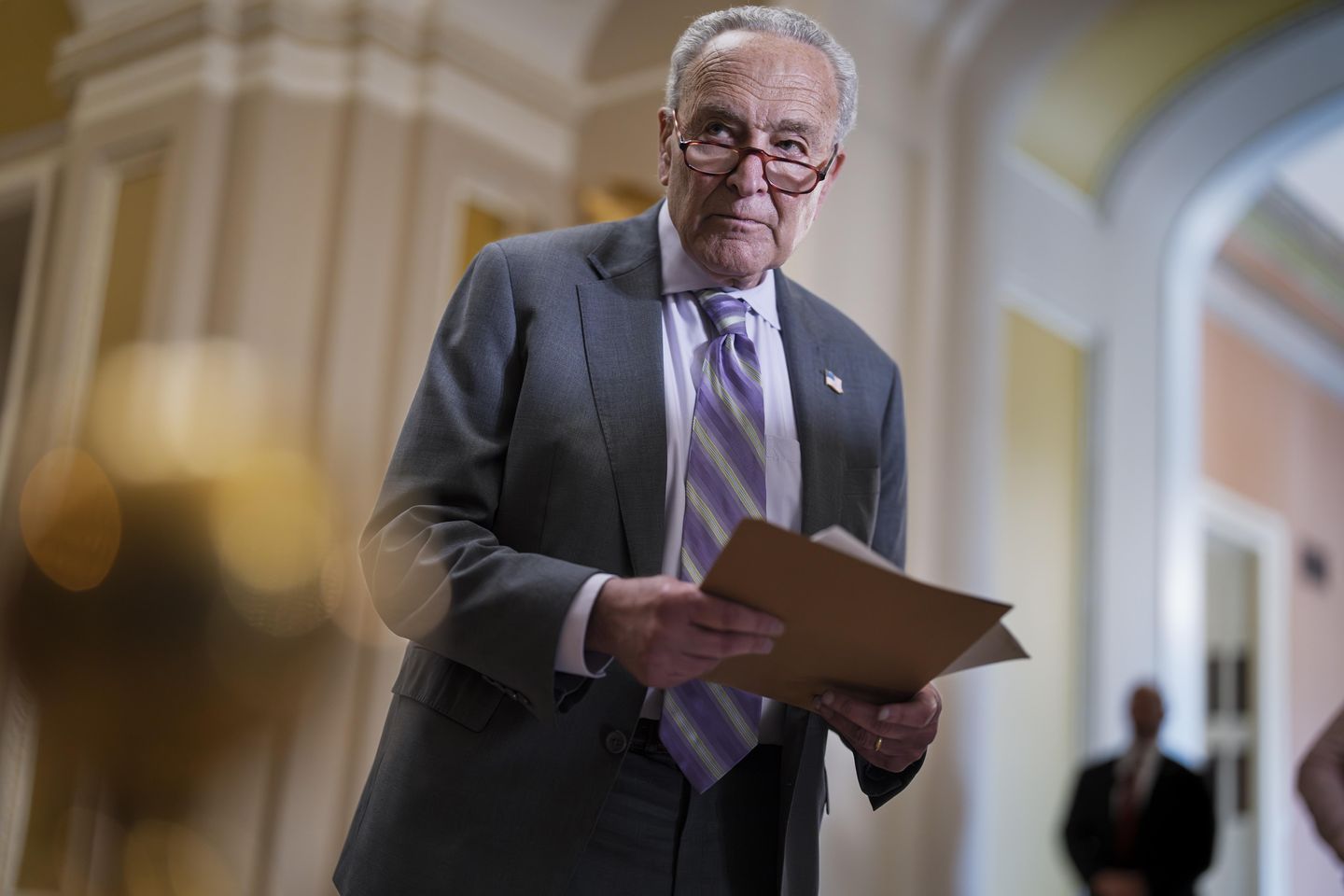
President Trump’s budget chief said Thursday that Congress’ broken appropriations process would be better if it were more partisan and Republicans had more control over spending.
That would yield “good results,” said Russell Vought, the director of the White House Office of Management and Budget.
“The appropriations process has to be less bipartisan,” he said. “We’re $37 trillion in debt.”
His comments — made at a breakfast interview with Washington reporters hosted by the Christian Science Monitor — quickly reverberated across the city at the Capitol.
Senate Minority Leader Charles E. Schumer called for President Trump to fire Mr. Vought for advocating more partisanship in spending decisions.
“I’m just furious,” the New York Democrat said. “Donald Trump should fire Russell Vought immediately before he destroys our democracy and runs the country into the ground.”
The annual appropriations process that funds the government has long been dysfunctional, but it is always somewhat bipartisan. Spending bills are subject to the Senate filibuster and thus require 60 votes and some support from the minority party to get through the chamber.
At the breakfast interview, Mr. Vought lamented the broken process in which Congress routinely passes stopgap bills that continue current funding levels or massive catchall packages called omnibus bills that further increase spending.
Lawmakers are supposed to pass 12 individual appropriations bills each year but never do so, despite attempts to move individual bills through committees and sometimes on the House and Senate floors.
Mr. Vought said that by passing catchall mega-bills, Congress makes it so they only need the president’s signature once, usually right up against the deadline to avert a government shutdown and making it difficult for the executive branch to push back.
“You’re going to put everything through on that omnibus bill and jam it through to get a signature, probably when five foreign affairs crises are happening, and he can’t afford to have that particular fight,” he said.
“I actually think that, over time, if we have a more partisan appropriations process for a time, it will lead to more bipartisanship,” Mr. Vought said.
Mr. Schumer called that viewpoint an attempt to destroy the balance of power and how Congress works, which he said should be a firing offense for an OMB director.
Mr. Vought said that while appropriators may want to preserve a bipartisan process for doling out taxpayer dollars, it’s not something Mr. Trump’s supporters, who voted elected him and a Republican-led Congress, care about.
“There is no voter in the country that went to the polls and said, ‘I’m voting for a bipartisan appropriations process,’” he said.
With Republicans holding full control of the government, Mr. Vought said now’s the time to rein in the debt and spending. He acknowledged that Congress holds “the power of the purse” but said that the funding lawmakers appropriate is a ceiling, not a floor.
“It is not the notion that you have to spend every last dollar of that,” Mr. Vought said.
His comments Thursday morning followed Senate passage of a partisan $9 billion spending cut package to codify some of the savings the Department of Government Efficiency has identified. The House was set to clear the package Thursday evening for Mr. Trump’s signature.
Congress is using a process known as rescissions to pass the spending cuts, which is exempt from the Senate filibuster.
Democrats have said Republicans and the Trump administration, by using the partisan rescissions process to cut spending Congress previously approved on a bipartisan basis, are showing they are not trustworthy negotiating partners. They’ve warned that it could undermine their ability to cut a bipartisan deal needed to fund the government by Sept. 30.
It’s in that context that Mr. Vought is advocating for a more partisan process to government funding so that Republicans can fulfill their promises to voters to cut wasteful spending in Washington.
“This is the kind of thing that’s necessary for us to change the paradigm of the way the town has worked,” he said of the rescissions package.
He also said the White House likely will send another rescissions package to Congress.
“We’re not there yet,” he said, adding that he didn’t want to “get ahead of the package itself.”
Mr. Vought did not detail a plan to fund the government come September without Democratic cooperation.
At the Capitol, Mr. Schumer dodged questions about how Democrats will handle those negotiations, given Mr. Vought’s comments and Republicans’ passage of the rescissions package.
“Ask the Republicans what they want,” he said. “Vought is trying to destroy our democracy, and the Republicans seem to be going along.”
White House press secretary Karoline Leavitt suggested Mr. Vought’s comments were misinterpreted as trying to shut Democrats out, but that he was trying to encourage them to get on board with cutting spending.
“I think our Office of Management and Budget director was saying this process should be more bipartisan,” she said. “There was a time in this country when Democrats, too, cared about getting rid of waste, fraud, and abuse in our federal spending. I think every American agrees the government spends way too much money on things that don’t matter.”










